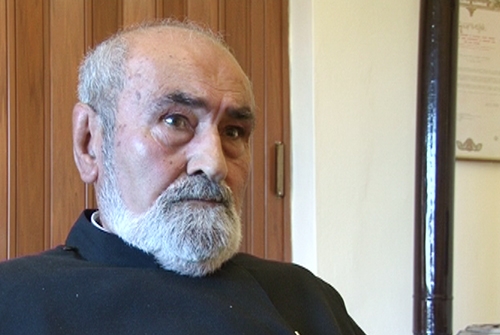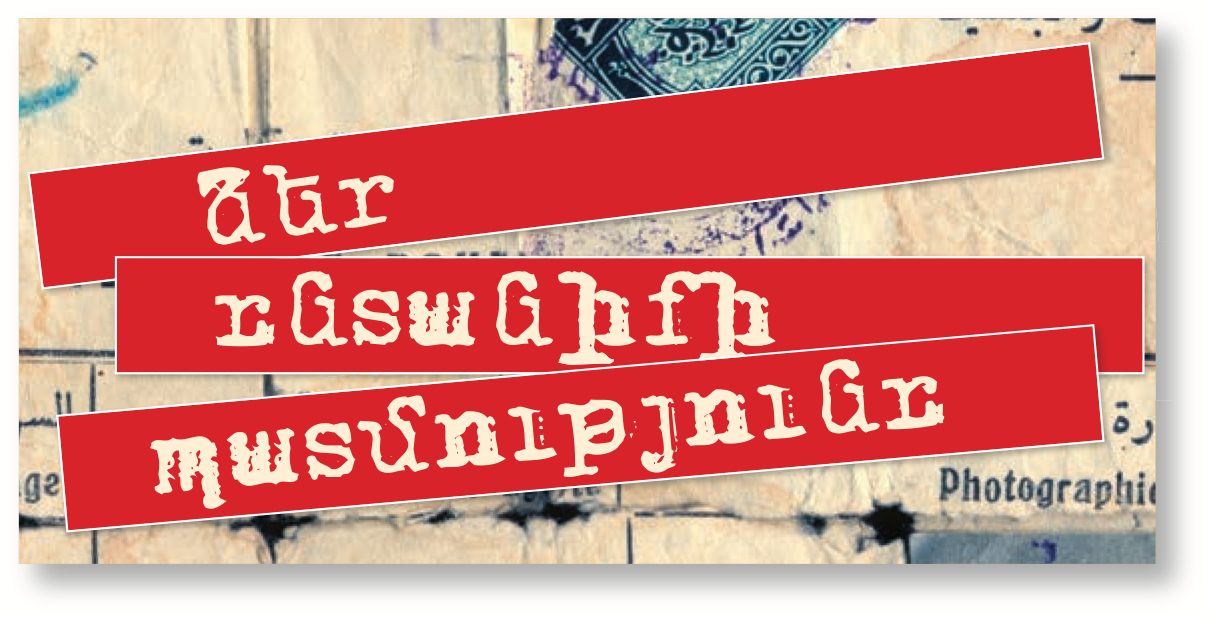 Anjar, Lebanon
Anjar, Lebanon
Father Arsen Keshishian
I had gone to Jerusalem as a student in 1945, so I wasn’t here when the repatriation happened. I was 16 at the time. My father wrote me a letter saying that they were going to Armenia. He said he didn’t know if it was a good place or not. If it’s good, he wrote, you will come as well.
Thus, I’m not informed as to the situation here. I am aware as to what happened in Jerusalem. A special delegation had arrived. Patriarch Gyuregh organized a special dinner for the occasion. There was great excitement there as well. Enthusiasm for the repatriation existed there as well. At the time, there were a large number of Armenians in Jerusalem, around 5-6,000. Only 2,000-3,000 have remained.
Aynjar at the time had some 1,200 families, of which 700 went to Armenia. 75% of the 190 families from here immigrated. Father Margos and Father Mardiros from the village of Khosmeh also immigrated. Father Margos is my father’s father’s brother, and Father Mardiros is my father’s mother’s brother.
Because my mother’s brother was going with the family, my mother declared that we have to go also. Thus, my father simply was subject to my mother’s demands. He too immigrated in 1947.
In Armenia, they went to Hoktemberyan, the 17th sovkhoz. My brother, who had grown up a bit, wanted to go to the town. He went to Etchmiadzin. There were many of our village compatriots there, from Kabusia. It was due to their help that he found a place in Etchmiadzin and moved there. He also wanted to bring my uncle there as well, but my uncle was a man who said what he meant and never backed down. He said he’d never move to Etchmiadzin.
Six months later, I received a letter saying: ‘Hagop, we are fine. When you come also bring your sisters Isgouhie and Srpouhie. Convince them to come with you.” But, this was all code. Telling me not to go, that things were bad. I never knew my sisters Isgouhie and Srpouhie. They died before I was born. I received a second letter a few months later. It told me to convince my uncle Kyurtam Hovsep to come to Armenia as well. But I know that uncle Kyurtam Hovsep died here. A third letter arrived – say hello to the toniri tarmouz. We used to bake bread in the tonir. If it fell in the ashes we wouldn’t eat it, but throw it to the dogs. That’s the toniri tarmouz. To say hello to it meant, we long for it.
My father came here in 1972. He went to the garden where we had apple trees. The harvest that year was huge. He looked around, kissed the ground and said, ‘I should have entered a mosque and prayed. I shouldn’t have gone to Armenia’.
One of our relatives, Kevork, went to Armenia and worked in the orchards for the first years. The head of a work crew there told Kevork that he liked him. The boss man wanted to marry his daughter off to Kevork. But Kevork’s parents refused. Relations soured after that. It was on a Sunday. Kevork was home weaving a basket or something. The crew chief came in and told Kevork it was time to go to work. Kevork replied that it was Sunday, his day off. There was an argument.
Kevork told his brother, ‘I will leave this country, but don’t say anything’. He already had studied the escape route. The fence on that stretch of bank of the Araks River had been electrified. So, he goes to a hill overlooking the river and finds a place to hide until nightfall. He waits until the changing of the guards and then slowly slides down the hill and crawls under the wire. As soon as he reaches the river, he hears the dogs barking. He enters the river. The dogs come and sniff around. As Kevork says, he swims across the Araks and reaches the other side.
Turkish shepherds find him on the other side, naked and dripping wet. They ask him questions, who are you and what are you doing here, etc. They immediately hand him over to the police. Luckily, nothing happened to him there. The police chief asks Kevork who he is, etc. ‘I am the son of Hovhannes Ghazarian’, he says. Hovhannes Ghazarian, Ghazarian…Yes, he says. Your father is a close friend of mine.
They take care of him. They dry his clothes and give him new clothes. They feed him and then send him on his way after he feels strong enough. They escort him to the Syrian border. From the Syrian border, friends take him to Lebanon. I was in Jerusalem at the time when he reached Aynjar. It was 1949.
Kevork said they lived in tough conditions. He brought back a piece of bread as a sample. It resembled a piece of atar, dried animal dung. We eat this bread, he said. One day, he said, he was up in the mountains there with a friend and a song about Antranig came into his head and he started to sing – as an eagle, you soar. His friend told him to be careful. ‘Kevork, watch out. Don’t sing that song here’.
Whatever. It was good that the repatriation happened and that the population of Armenia filled out and the country was maintained. But what happened. Those immigrants were told such propaganda. For example, if you press a button, the table comes with all the meals you want on it. You’ll eat and drink…Sadly, the people were taken in and went. Whoever had anything to do with the ARF, even saying hello, were considered Tashnags and were deported. Thousands were exiled in such fashion. From Aynjar alone, perhaps some 300-400 families were exiled to Siberia.
I went to Armenia in 1966 and saw all my relatives. But I didn’t see my mother, who died in 1963. We wanted to tour the country. They told us we had to go to Ovir for a permit. That’s to say, at the time you could only tour Sevan and from Yerevan to Hoktemberyan. We went to get the permit and were told to come back in a week. But the tour was to start in two days. I participated along with my wife. I was still a student for the priesthood.
It was a good tour – Sevan, Dilijan, Kirovakan, Leninakan, etc. Despite the difficult conditions, people had found a way to live a good life. I later found out that the luxury I saw was because they were hosting guests.
Before returning, I went back to Ovir. They said, a while ago you asked for a permit to tour the country. Why didn’t you come back for it? I told them, the tour happened. How did you go? they asked. You told me to come back in a week, but my friends organized a tour for us in the meantime. Where could I have gone on my own?
Another incident happened. We went to the town of Ararat. I wanted to see Khor Virap. There was a Kesabtsi engineer there who said he’d take us. It was a Sunday. At the same time, they were to elect a deputy. The man said, ‘We’ll go, do our duty, and then we’ll go to Khor Virap. By the way, he was a communist. First we went to the voting place. He said, ‘I and my collective…’ and placed a sack of ballots in the box.
Wed went to Khor Virap, went down and said our prayers. Later, because Ararat was so close, I wanted to take a picture. Someone saw me from below and immediately two people arrived. The Kesabatsi engineer went pale in the face. One of them climbed down into the pit to see if anyone else was there. Your passport? Please. Your visa? Please. Your permit to come here? We don’t have a permit. Bitter words started to fly. He said, the law demands that you be sent back without seeing Etchmiadzin. Have you finished? Yes, he said. I took the passport from his hand and said, ‘This is my legal passport and the visa is inside. It’s a legal visa. To come to Ararat we went to the commandant. He wasn’t there, so the border patrol officials gave us permission and we came. I am a teacher and am interested in Armenia’s historical places. When I return home, what will I tell my students?’
He man said, ‘There are many good and bad people in the world. It looks like you’re one of the good ones. So, our Ararat to you as a gift.



















